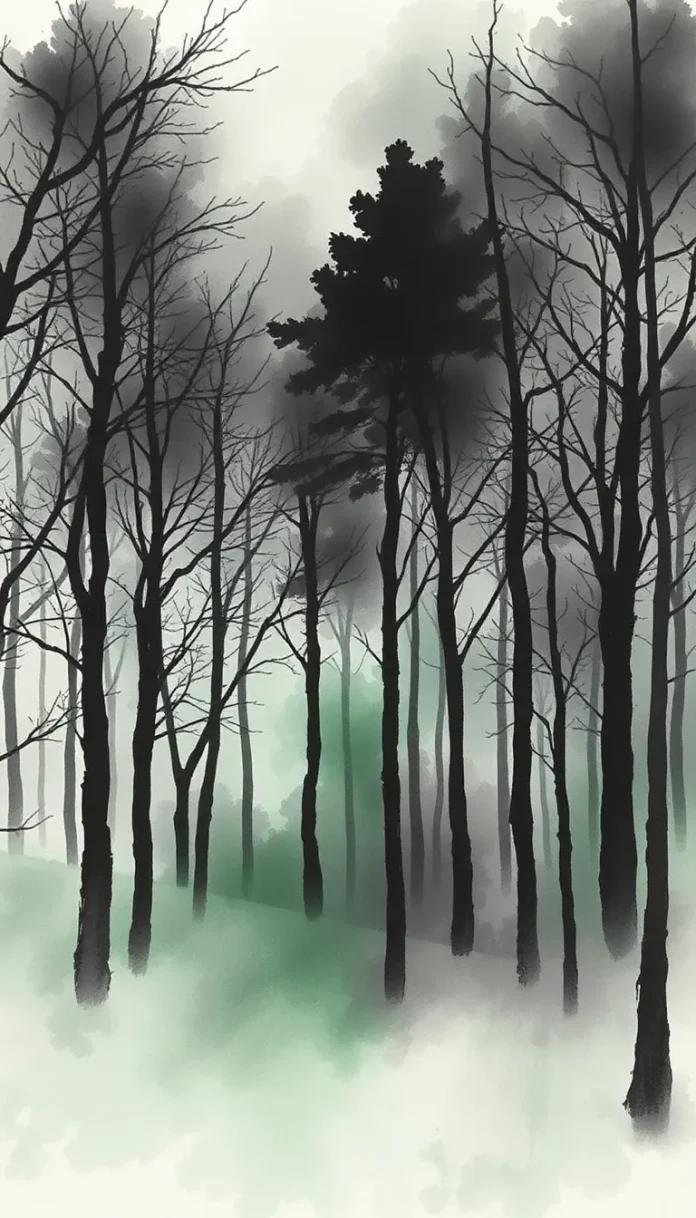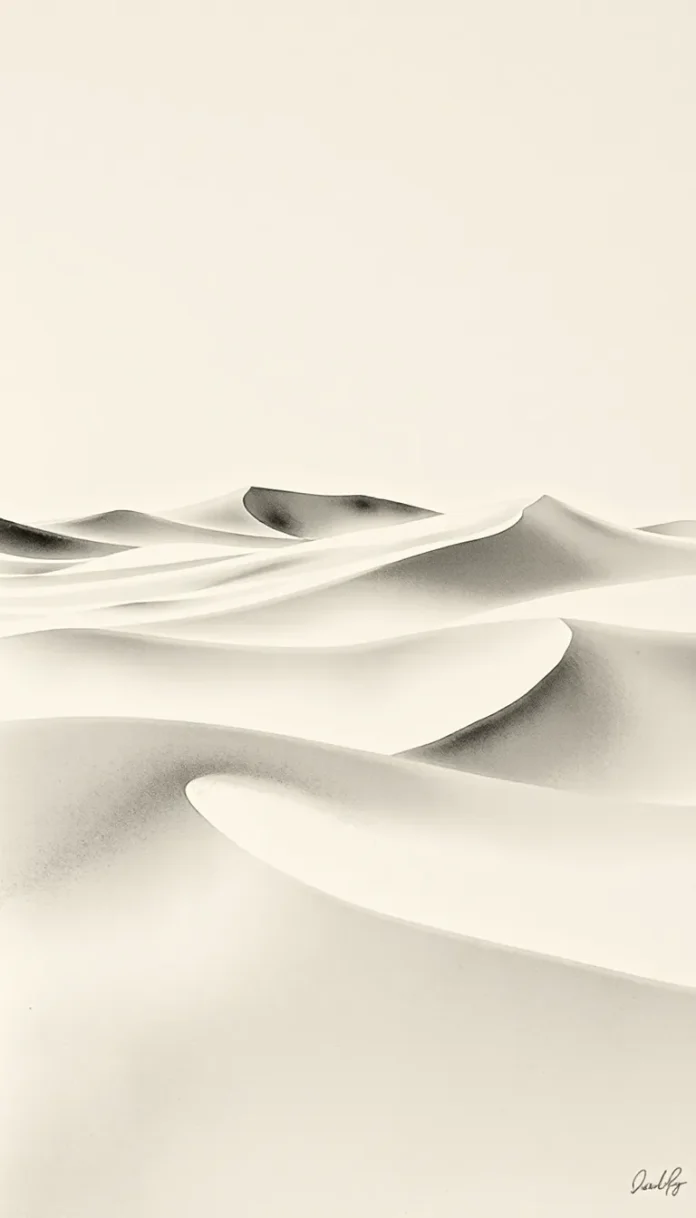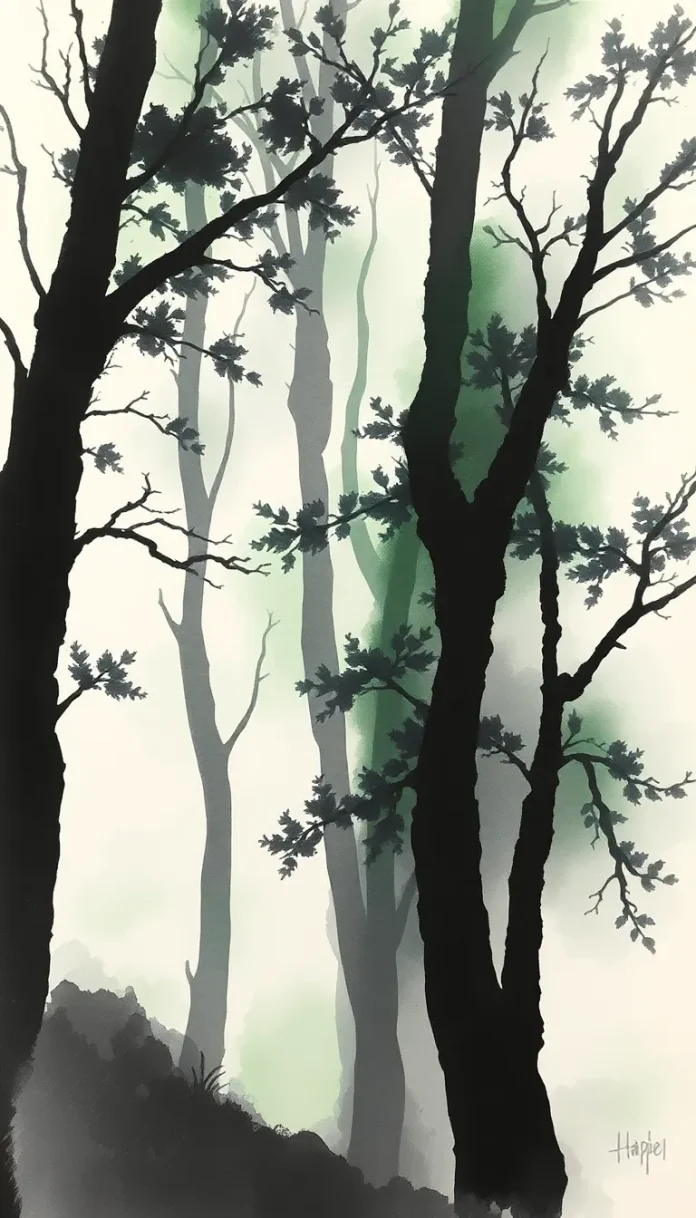The Canticle of Ash and Unkept Vows
the cursed bard whose verses built this ruin—
his boot heels crack like fate on cobblestones
where once his ballads gilt the boulevards.
Now spectres hum the refrains in his wake,
their breath the wind through arches scoliotic,
their eyes the shards of stained glass underfoot.
He names the streets by what they used to hymn:
Aubade Lane, where dawn’s pink throat lay slit;
Dirge Alley, choked with ivy’s black cravat;
Promise Square—ah, there his step fractures—
its dry fountain a gaping mouth of coins,
each tarnished disc engraved with *Tomorrow*.
(Three springs ago, when lilacs ruled the air
and her laughter unspooled like silk from looms,
he knelt where pigeons now molt silver feathers.
“Before next autumn sheds its copper cloak,”
he vowed, ink-stained palms upturned like pages,
“I’ll bind our tale in parchment never-rotting—
a epic to outlive cathedral spires.”
Her kiss, the wax that sealed the covenant.)
The curse began as all such plagues must start—
with beauty. His quill birthing such radiant lies
that trees uprooted to parade as lovers,
rivers reversed their flow to hear couplets,
and stars, those peepholes to heaven’s ballroom,
lowered their chandeliers to catch his whispers.
But oh, the price for making metaphors breathe!
Each stanza cost a month from his lifespan,
each simile leached color from his iris,
until his shadow frayed at its edges,
a tapestry undone by hungry moths.
She pleaded through the fevered nights he wrote,
her voice the single thread still tethering him:
“Your ballads bloom while real roses wither—
come walk with me where words hold no dominion!”
But he, drunk on the wine of his own genius,
let deadlines of the flesh eclipse her heartbeat,
mistook her tears for just another muse.
When autumn came, rust chewing through the maples,
she left no note—just her wedding veil
nailed to the door with his own laurel dagger.
That night, his pen bled cities into being:
spires of salt, boulevards of thinned-out milk,
a municipal dream turned necropolis
where every echoed footstep rhymes with *guilt*.
Now spectres compose his audience:
the baker whose bread rose with his sonnets,
the lamplighter who danced to his dactyls,
all now ashen, their mouths O’s of surprise.
They trail him through the labyrinth of blame,
their whispered critiques sharper than his nib:
“Where is the canto praising her patience?”
“Why does the bridge forget her Sunday hymns?”
In the amphitheater of his disgrace,
he tries to chant their stories into grace—
apologia etched in iambic sighs—
but every line unravels into smoke,
the letters scattering like startled sparrows.
Ghosts yawn, their boredom acid on his skin.
At last he climbs the crippled bell tower,
its stairs the spine of some petrified beast,
to where the final page of his life’s work
flaps chained and wild against the chapel rafters.
Here, in the nest of his forsaken oath,
he finds her—or the idea of her—
a sculpture carved from midnight and regret,
her marble gown wind-rippled into motion,
her eyes two wells where moonlight goes to drown.
“Beloved forgemistress of my ruin,”
he rasps, the words flaying his calloused throat,
“I’ve come to pay the debt in compound sorrow—”
Her laugh, a harpsichord dropped down a cliffside:
“Still framing life as ledger entries, poet?
You built this mausoleum from maybes,
entombed us both in verbs and variables.
What use your iambs to the truly breathless?
No stanza can resurrect what deadlines killed.”
The truth, a vulture, pecks his ribs apart.
Below, his city of metaphors decays—
the bridge of sonnets lists into the river,
the library of eyes dissolves to sludge.
Somewhere, a real woman tends real gardens,
her hands wrist-deep in unpretentious soil,
her new name blooming sans his pretensions.
Dawn arrives—not the gilded lie he’d write,
but mean and yellow as a tavern bruise.
His fingers clutch the manuscript’s last leaf,
its vellum pregnant with unwritten grief.
The curse demands its climax: one last verse
to freeze the world into a perfect cry.
He inscribes the air with his bone stylus,
each letter a wound, each space a silence
wider than the sea between two lifetimes.
The city holds its breath. The ghosts lean in.
*”Here lies the architect of air,”* he writes,
*”who mistook love for something to be earned,
whose ballads built a labyrinth of absence,
who learned too late that promises unmade
outlive the pyramids of perfect couplets.
Let this be carved where no eyes ever wander:
The truest poems are the ones we lived—
all others are just elegies in ink.”*
As the period seals his confession,
the tower sighs and folds into itself,
each brick a page returning to pure pulp.
His body, now a comma curling inward,
dissolves into the footnote of her memory.
Some say the ruins hum on moonless nights—
not with his voice, but hers, low and earthy,
chanting the names of flowers that need no verses
to validate their brief, unstudied bloom.
“`


